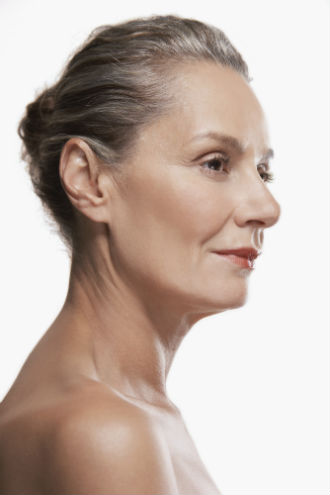Time for a change?
It will affect the vast majority of your clients – and your staff – at one time. Yet we still don’t really like to talk about it. In fact, many therapists don’t fully understand it. It may be a tough subject to discuss with clients, especially for therapists in their 20s, but menopause is also the most important time for skincare in a woman’s life. Hormonal changes taking their toll on the skin mean that the skincare clients have been using their whole adult life is no longer right for them. They are most in need of a therapist’s expertise, and what’s more, they’re willing to spend.
Spending on anti-ageing skincare by women in their 50s and 60s grew by 200% in 2013, according to beauty retailer Escentual.com. The research found that women in their 50s will spend on average £220 per year on skincare, compared to women in their 30s, who spend £140. “The over-50s market is huge, but if you take menopausal women as just a subsection, that’s probably the market with the greatest need,” says Tim Clover, chief executive of Forme Labs, which recently produced menopause skincare line Stratum C.
According to Clover, the menopausal market represents 2-2.5million people in the UK, and he estimates 25% of salon clients could fall into this category. Clare Muir training manager for Environ distributor iiaa, estimates that as many as 40% of the clients regularly visiting salons today are menopausal or post-menopausal, but that salon owners and therapists tend to brand all clients under the bracket of “anti-ageing”. “You can’t be as black and white as ‘young clients and old clients’. You can have a 35-year-old who’s photodamaged and ageing, but her skin is not ageing in the same way as a 55-year-old, post-menopausal woman, so the approach you have to take should be very different.”
Hero Ingredient: Vitamin A
“This is great for an oily skin,” says Clare Muir “because it will be able to communicate with the sebaceous gland and tell the skin not only how much oil to produce, but also the right type of oil.” Vitamins A and C are also great for collagen and elastin production”
Taking its toll
The effects of menopause cannot be underestimated. Loss of oestrogen and progesterone reduces collagen production by about 30%, leaving the skin to sag. It also leads to thinning, papery skin. Marie McKeever, head of professional treatment training at Clarins, which is due to launch its Super Restorative range for menopausal skin into the UK later this year, says that in the five years following menopause, skin loses around 50% of its thickness. The hormone imbalance can lead to facial hair, and disrupt the sebaceous glands, leaving skin either very dry, or oily and spotty. Kendra Flockhart, Darphin education executive, explains the hot flushes that are a common symptom during menopause can cause expansion and breakage of capillaries, which can lead to rosacea. “It really manifests itself very differently according to the individual,” adds Noella Gabriel, head of product and treatment development at Elemis. “One of the biggest issues is menopausal acne, which can be very distressing, especially if you’ve never had acne before.”
Whatever the symptoms suffered, clients often have little understanding of what’s really going on with their skin, or what they need from their skincare to address it. “Clients become so used to always buying a specific product for years, and when they have to make a change they have no idea what they require, or even why a change is required,” says Jeanne Balaam, international training manager for naturals brand Living Nature. 
That’s where a therapist’s skills come into their own. “It’s almost a crisis purchase,” says Clover, “and I think when you have that, you’ve got to have some education around it.” During his market research prior to launching Stratum C, Clover found that very few retailers knew which skincare to recommend to menopausal women. Gabriel says that, with so many physical changes to contend with during menopause, researching the needs of her changing skin is often last on a client’s list of priorities. “Clients see the change in their skin but normally put it down to just getting old,’” says Muir. “There’s a huge opportunity to educate them on the physical change menopause has on the skin and what we can do to help.”
Hero Ingredient: Colostrum
“We’ve found this really beneficial on menopausal skin,” says Muir. “It stimulates growth factors, which really give a vast re-plumping of the epidermis and dermis, so it’s great when you get that thin, delicate skin”
Good to talk
It’s no secret that thorough consultations are the key to quality treatments, but for this market, it’ s even more important. It’s only by having detailed conversations with your client about the changes going on in her skin that you’ll be able to identify what she really needs, and during such a sensitive time it’s crucial to build up a level of trust.
“You have to really listen to your client. What are her true concerns? When you start to really engage with her, you’ll get the level of knowledge you need,” says Gabriel. Muir agrees that therapists should be prepared to invest time in the consultation. “A 15-minute consultation isn’t going to do it,” she says. “If you’re seeing someone who’s going through the menopause they’re not going to open up to you in 15 minutes. You really need that half an hour.”
To provide that quality service, you need to make sure your team are equipped to deal with this market; that they fully understand what’s happening to the skin and can talk frankly yet sensitively about it. “I think the reason therapists don’t put that time into a consultation is because they’re not confident in what’s happening and how to deal with it,” says Muir.
Last year, Elemis trainers focused on educating therapists on how to deal with women of this age, following the launch of its Pro Intense range, which is aimed at that market. “We went back into really educating them about how skin changes and also the language to use around it to get a client to open up,” says Gabriel.
Hero Ingredient: Matrixyl
Rather than topical collagen, which won’t penetrate the skin, matrixyl will help skin to produce its own collagen. But it doesn’t come cheap. Clover says because the raw ingredients are so expensive, many of the products that claim to contain matrixyl have very low levels – well below the concentration needed to boost collagen production
Home care
Facials designed to stimulate collagen production are ideal for this market, but good, tailored retail recommendations are also crucial.
With anti-ageing skincare technology advancing all the time, there is plenty of scope to offer clients the powerful products they need to use between appointments. “We’ve got beautiful formulations and actives to play with, so we can be far more targeted now,” says Gabriel. However, Clover warns that products boasting hero ingredients don’t always deliver on their promises. “It’s futile to put a collagen cream on, because it just sits on the surface,” he says. “Whereas if you use certain concentrations of a group of peptides it stimulates skin to produce its own collagen.”
Such technologically advanced skincare may not be cheap, but these clients are not looking for a bargain – they’re looking for results. “They’re people with money in their pocket and a real need,” says Clover. And therapists are perfectly positioned to provide them with the service and the expertise to meet that need.
 SALON VIEW: Karen Ismail, Peach on the Hill, London
SALON VIEW: Karen Ismail, Peach on the Hill, London
“We have a lot of women in their late 40s and early 50s, so we see the changes in their skin. I’m not into exfoliating or using aggressive peels, because I don’t want to work on the top layer; I want to work from the inside.
I find our clients have two types of skin: one is very thin, veiny and sensitive, and the other has deep lines and a rough appearance on the surface. The first thing you think when you see that roughness is to scrub it off, but you should do the opposite – work on it from the inside.
We’re based in Kensington, so my clients are very aware of themselves. They might not be fully aware of what’s happening underneath, but they want us to fix what’s happening on the surface as best we can, without any Botox or fillers. I’ve found since they’ve started taking vitamins internally as well, the whole thing works a lot better. I say to them, ‘you go to the dentist twice a year, but you clean your teeth at home. So you come and see me, but I would hope you look after your skin at home too’.”
 SALON VIEW: Kirsty Hughes, Vineyard Spa, Berkshire
SALON VIEW: Kirsty Hughes, Vineyard Spa, Berkshire
“Probably 20-25% of my total clientele suffer with menopausal skin. It’s when they reach that age and they’re really concerned about ageing that they come for facials regularly. Younger clients have the odd one or two but it isn’t their priority.
If they’re fully going through the menopause we have to be aware that they’re usually suffering with hot flushes, so we need to stay away from heat treatments such as hot stones massage.
For most women it’s a really frustrating time because their skin’s suddenly changed. Doctors don’t go through the changes to expect in the skin, so if they’ve got concerns, coming to see a therapist is the only route for them. This is when we see a lot more women for the first time, when they’re going through these problems with their skin and they want some advice.”
